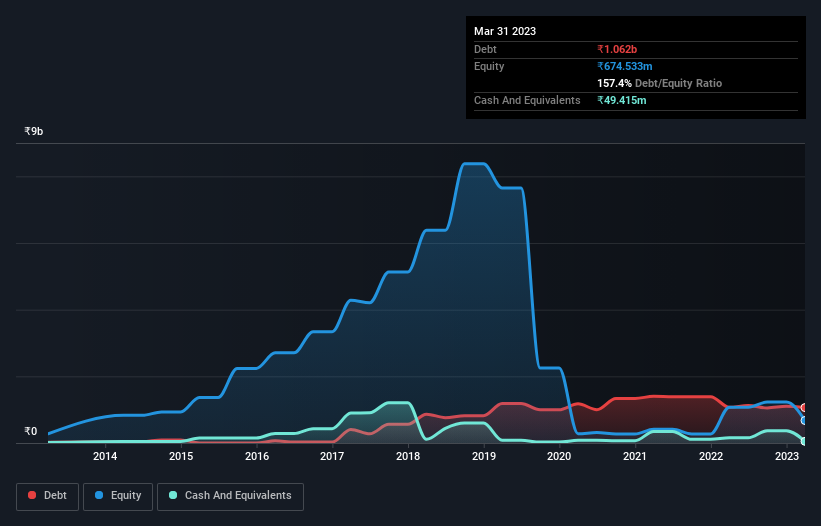Is SecureKloud Technologies (NSE:SECURKLOUD) A Risky Investment?
Some say volatility, rather than debt, is the best way to think about risk as an investor, but Warren Buffett famously said that 'Volatility is far from synonymous with risk.' It's only natural to consider a company's balance sheet when you examine how risky it is, since debt is often involved when a business collapses. We note that SecureKloud Technologies Limited (NSE:SECURKLOUD) does have debt on its balance sheet. But the more important question is: how much risk is that debt creating?
When Is Debt Dangerous?
Debt is a tool to help businesses grow, but if a business is incapable of paying off its lenders, then it exists at their mercy. Ultimately, if the company can't fulfill its legal obligations to repay debt, shareholders could walk away with nothing. However, a more common (but still painful) scenario is that it has to raise new equity capital at a low price, thus permanently diluting shareholders. By replacing dilution, though, debt can be an extremely good tool for businesses that need capital to invest in growth at high rates of return. The first thing to do when considering how much debt a business uses is to look at its cash and debt together.
Check out our latest analysis for SecureKloud Technologies
What Is SecureKloud Technologies's Net Debt?
The chart below, which you can click on for greater detail, shows that SecureKloud Technologies had ₹1.06b in debt in March 2023; about the same as the year before. However, it also had ₹49.4m in cash, and so its net debt is ₹1.01b.

How Strong Is SecureKloud Technologies' Balance Sheet?
The latest balance sheet data shows that SecureKloud Technologies had liabilities of ₹1.76b due within a year, and liabilities of ₹437.3m falling due after that. On the other hand, it had cash of ₹49.4m and ₹694.7m worth of receivables due within a year. So its liabilities outweigh the sum of its cash and (near-term) receivables by ₹1.46b.
When you consider that this deficiency exceeds the company's ₹1.30b market capitalization, you might well be inclined to review the balance sheet intently. In the scenario where the company had to clean up its balance sheet quickly, it seems likely shareholders would suffer extensive dilution. There's no doubt that we learn most about debt from the balance sheet. But it is SecureKloud Technologies's earnings that will influence how the balance sheet holds up in the future. So if you're keen to discover more about its earnings, it might be worth checking out this graph of its long term earnings trend.
In the last year SecureKloud Technologies wasn't profitable at an EBIT level, but managed to grow its revenue by 21%, to ₹4.6b. With any luck the company will be able to grow its way to profitability.
Caveat Emptor
While we can certainly appreciate SecureKloud Technologies's revenue growth, its earnings before interest and tax (EBIT) loss is not ideal. Its EBIT loss was a whopping ₹910m. Considering that alongside the liabilities mentioned above make us nervous about the company. We'd want to see some strong near-term improvements before getting too interested in the stock. Not least because it had negative free cash flow of ₹499m over the last twelve months. So suffice it to say we consider the stock to be risky. When analysing debt levels, the balance sheet is the obvious place to start. But ultimately, every company can contain risks that exist outside of the balance sheet. Be aware that SecureKloud Technologies is showing 3 warning signs in our investment analysis , and 2 of those shouldn't be ignored...
At the end of the day, it's often better to focus on companies that are free from net debt. You can access our special list of such companies (all with a track record of profit growth). It's free.
New: Manage All Your Stock Portfolios in One Place
We've created the ultimate portfolio companion for stock investors, and it's free.
• Connect an unlimited number of Portfolios and see your total in one currency
• Be alerted to new Warning Signs or Risks via email or mobile
• Track the Fair Value of your stocks
Have feedback on this article? Concerned about the content? Get in touch with us directly. Alternatively, email editorial-team (at) simplywallst.com.
This article by Simply Wall St is general in nature. We provide commentary based on historical data and analyst forecasts only using an unbiased methodology and our articles are not intended to be financial advice. It does not constitute a recommendation to buy or sell any stock, and does not take account of your objectives, or your financial situation. We aim to bring you long-term focused analysis driven by fundamental data. Note that our analysis may not factor in the latest price-sensitive company announcements or qualitative material. Simply Wall St has no position in any stocks mentioned.
About NSEI:SECURKLOUD
SecureKloud Technologies
Provides information and technology services in India and the United States.
Slight risk and slightly overvalued.
Similar Companies
Market Insights
Community Narratives


Recently Updated Narratives

Constellation Energy Dividends and Growth

CoreWeave's Revenue Expected to Rocket 77.88% in 5-Year Forecast

Bisalloy Steel Group will shine with a projected profit margin increase of 12.8%
Popular Narratives


MicroVision will explode future revenue by 380.37% with a vision towards success


NVDA: Expanding AI Demand Will Drive Major Data Center Investments Through 2026



